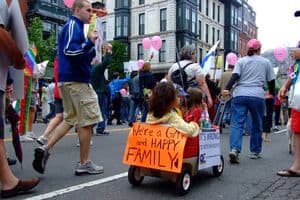 Anyone familiar with debate surrounding marriage equality is likely familiar with the "traditional family" argument. That is, those arguing against same-sex marriage commonly maintain that children supposedly "do better" when in a household with two parents of the opposite sex. Now, a new study, conducted by Dr. Simon Crouch of the University of Melbourne, seeks to address that very claim. The results may prove harmful to those advocating the so-called "traditional family".
Anyone familiar with debate surrounding marriage equality is likely familiar with the "traditional family" argument. That is, those arguing against same-sex marriage commonly maintain that children supposedly "do better" when in a household with two parents of the opposite sex. Now, a new study, conducted by Dr. Simon Crouch of the University of Melbourne, seeks to address that very claim. The results may prove harmful to those advocating the so-called "traditional family".
"The Australian Study of Child Health in Same-Sex Families, conducted at Melbourne University, collected data on the mental, physical, and social wellbeing of 500 children from around the nation up to the age of 17. The study also interviewed 315 gay, lesbian, and bisexual parents, asking them to complete the Child Health Questionnaire, which is recognized around the world. Preliminary results indicated that children of gay and lesbian parents were no different from their peers raised by straight parents in terms of physical and mental health, and in their interactions with others and their parents."
Interim results indicated that there was no noticeable difference between children of same-sex and opposite-sex parents in terms of physical health, mental health, or interactions with their parents. When it came to family cohesion and general health, children of same-sex couples actually managed to score higher than their counterparts who were raised by opposite-sex couples. The study indicated only one area in which children of same-sex couples did suffer, and that was when they were subject to discrimination based on their parents' sexuality.
According to PinkNews, this study is "the world's largest of its kind on gay parenting." Dr. Crouch, and openly gay father of twin four-year-old boys, stated that he was prompted by the equal marriage and gay adoption debate, especially those arguing that children supposedly "did better" when raised by opposite-sex parents. He disagreed…
"Our research does not support this. There are a lot of same sex families where there isn't a mother figure or there isn't a father figure and we find that the children are doing really well."



